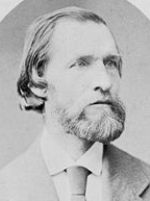Presents
Friedrich Hermann
|
|
 |
Soundbites courtesy of Steve Jones |
String Quartet in e minor, Op.8
Friedrich Hermann (1828-1907) was born in the German city of Frankfurt am Main. He was a student at the Leipzig Conservatory, studying composition with Mendelssohn and Niels Gade and violin with Ferdinand David. After graduating he obtained the position of principal violist of the Leipzig Gewandhaus Orchestra, and at the age of 19 started teaching at the Conservatory where he later became a professor. Besides his work with the Conservatory and the Orchestra, Hermann was a member of the Gewandhaus Quartet. In 1878, in order to devote himself to teaching, composing, and editing, he resigned all appointments except the Conservatory. His work as an editor is well known and includes compositions by Haydn, Mozart, Beethoven as well as those by the famous violinists such as Kreutzer, Beriot and Rode.
In addition to his work as an editor, he composed a symphony, a quartet for wind instruments, and several other chamber music works, which clearly shows his affinity with the new emerging romantic virtuoso style that was part and parcel of 19th century string playing. Here is what The Chamber Music Journal had to say about this work:
“Friedrich Hermann's String Quartet in e minor, Op.8 was composed during the 1850's, not long after Mendelssohn's death, who at the time had been considered the greatest composer since Beethoven. Hence, it is hardly surprising that the compositions of a recent student of Mendelssohn should show the influence of that master. This is not particularly evident however in the opening movement, Allegro appassionato. A dramatic solo in the cello brings forth the lyrical and yearning main theme, later to be taken up by the violins. The second section is gentler, almost pastoral. The second movement is a Scherzo. Here the influence of the great Felix can be heard at once. By turns exciting and then playful, this appealing music could well have been written by Mendelssohn. The opening tonality of the Adagio, which comes next, reminds a bit of Mozart's Dissonant Quartet but this quickly leads to a highly romantic song without words, full of long-lined singing melodies. The finale, Allegro scherzando ed assai vivace, might well have been entitled "orientale" with its original, eastern-sounding main theme. In the two following themes, again we can hear echoes of Mendelssohn. This is really a very good work, which is fun to play, of no technical difficulty and should be quite attractive to amateur quartet players."
We have reprinted the original and only edition, however, adding rehearsal numbers and correcting a few mistakes. Long out of print, we are pleased to make this quartet available again.
Parts: $24.95